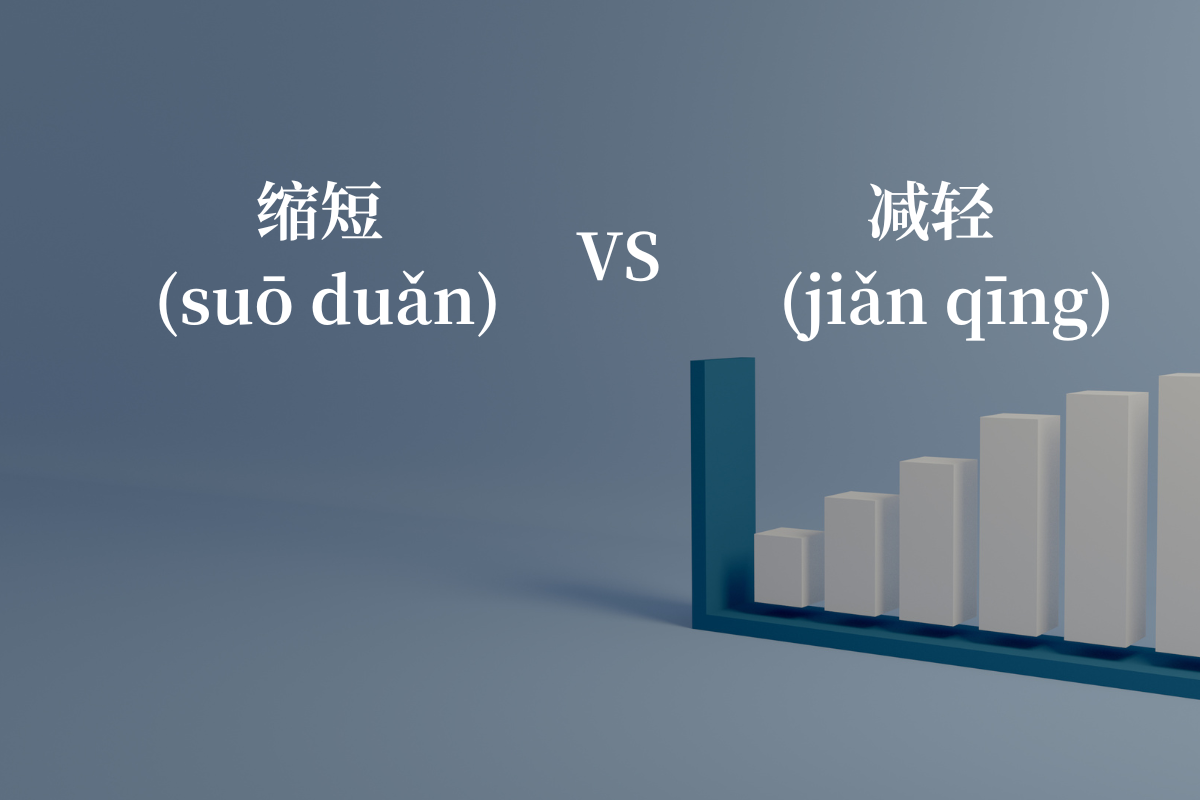HSK 5 Words: 缩短 (suō duǎn) VS 减轻 (jiǎn qīng)
In the rich tapestry of Chinese vocabulary, words often carry multiple layers of meaning, nuances that can be challenging to capture in translation. Among these, the verbs 缩短 (suō duǎn) and 减轻 (jiǎn qīng) stand out as prime examples of terms that, while seemingly straightforward, hold subtle differences in their applications and implications. Understanding these differences is crucial for accurate communication in both spoken and written Chinese.

缩短 (suō duǎn) primarily refers to the act of reducing the length, duration, or distance of something. It is often used to describe the process of making something shorter or faster.
Examples:
- The schedule has been shortened by two hours.
日程被缩短了两个小时。
rì chéng bèi suō duǎn le liǎng gè xiǎo shí。 - We need to shorten the distance between the two points.
我们需要缩短两点之间的距离。
wǒ men xū yào suō duǎn liǎng diǎn zhī jiān de jù lí。 - The project was delayed, but we managed to shorten the delay.
项目延期了,但我们设法缩短了延期时间。
xiàng mù yán qī le, dàn wǒ men guǎn lǐ le suō duǎn yán qī de shí jiān。
On the other hand, 减轻 (jiǎn qīng) is used to describe the reduction of weight, burden, or intensity. It often implies a lessening of pressure or difficulty.
Examples:
- The new technology has greatly reduced the workload, thus lightening the burden on employees.
新技术大大减轻了工作量,从而减轻了员工的负担。
xīn jì shù dà dà jiǎn qīng le gōng zuò liàng, cóng ér qīng miǎn le yuán gōng de fù dān。 - The pain in my back has gradually eased off.
我背上的疼痛逐渐减轻了。
wǒ bèi shàng de téng tòng zhú jiàn jiǎn qīng le。 - The doctor prescribed medication to help reduce the severity of the headache.
医生开了药来帮助减轻头痛的严重程度。
yī shēng kāi le yào lái bāng zhù jiǎn qīng tóu téng de yán zhòng chéng dù。
In summary, 缩短 (suō duǎn) and 减轻 (jiǎn qīng) are two distinct words in Chinese. 缩短(suō duǎn) is used to refer to the reduction of length, duration, or distance, while 减轻(jiǎn qīng) focuses on the lessening of weight, burden, or intensity. Understanding the specific meanings of these words and their appropriate usage can enhance your Chinese language proficiency and communication skills.
Quiz: Please decide whether to use 缩短 (suō duǎn) or 减轻 (jiǎn qīng) in the following sentences.
- 为了______负担,他决定放弃一些不必要的任务。
wèi le ______ fù dān, tā jué dìng fàng qì yī xiē bù bì yào de rèn wù。 - 由于新的交通规定,上下班通勤时间被______了。
yóu yú xīn de jiāo tōng guī dìng, shàng xià bān tōng qín shí jiān bèi ______ le。 - 他一直在寻找方法来______学习新语言所需的时间。
tā yì zhí zài xún zhǎo fāng fǎ lái ______ xué xí xīn yǔ yán suǒ xū de shí jiān。
Answers:
- 减轻 (jiǎn qīng)
- 缩短 (suō duǎn)
- 缩短 (suō duǎn)